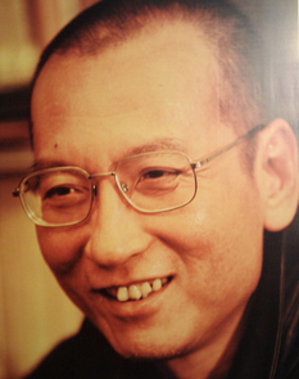 Aung San Suu Kyi (left) and Liu Xiaobo (bottom) have similar destinies. Both are fighting for democracy in their countries and both were locked up by governments that do not respect freedom of expression.
Aung San Suu Kyi (left) and Liu Xiaobo (bottom) have similar destinies. Both are fighting for democracy in their countries and both were locked up by governments that do not respect freedom of expression.
The Chinese government reacted to Aung San Suu Kyi’s release by calling her an “important political figure” and voicing confidence in the process of peace and ethnic reconciliation in Burma. So why shouldn’t it follow suit with Liu? Reporters Without Borders ask. There is an urgent need to end his unjust imprisonment.
Liu family under pressure
Meanwhile, there has been no let-up in the harassment and pressure on Liu’s family and supporters and all the other free speech activities in the People´s Republic of China.
The Chinese government has already tried to dissuade diplomats from attending the Nobel award ceremony on 10 December in Oslo and has prevented several Chinese human rights activists from leaving the country in case they go to Oslo.
Liu’s wife, Liu Xia (below), is still under house arrest while his brothers are pessimistic about their chances of being able to travel. Liu has also been denied a monthly visit by relatives. Mo Shaoping, a human rights lawyer who supports Liu, is among those who have been prevented from traveling abroad.
“It’s pretty shameful affair, the first time in  a century,” said Shang Baojun, Liu’s legal representative.
a century,” said Shang Baojun, Liu’s legal representative.
“In the past, usually there has been someone able to receive the prize [on the laureate’s behalf]. This situation is setting a very bad precedent,” Shang said.
The Nobel Committee could as a result find itself unable to hand over this year’s peace prize, said one of its leading members, Geir Lundestad, describing Liu as “one of the most important Nobels in history.”
Dozens of political and human rights activists have been held under temporary house arrest, and prevented from leaving the country for any reason since the October 8 announcement.
Authorities continue to arrest supporters
Guo Xianliang, an Internet writer known as the “Tianshan Hermit” has been detained in the southern city of Guangzhou for distributing leaflets referring to Liu in the city’s parks and streets. Li Hai, a member of the Independent Chinese PEN Centre, was arrested on 30 October. His family has had no news of him since then.
Hua Ze, a freelance journalist and human rights activist who used to work as a documentary film-maker for the government TV station CCTV, was abducted in the Beijing metro on 27 October and deported to Jiangxi, her home province, where she is now under house arrest.
Human rights lawyer Teng Biao reported in a message posted on Twitter that Beijing resident Shen Minqiang was arrested while giving  an interview outside Liu’s home on 8 October. He has been placed under a non-judicial form of detention and it is unclear what he is charged with.
an interview outside Liu’s home on 8 October. He has been placed under a non-judicial form of detention and it is unclear what he is charged with.
“Lack of respect”
the People´s Republic of China reacted furiously when the award was announced on October 8, saying it amounted to a lack of respect for its legal system, as Liu is currently serving an 11-year jail term for subversion.
Chinese diplomats have put pressure on foreign dignitaries not to attend, and six countries, including the Russian Federation, Cuba, and Iraq, have said they will not come.
Most Western countries, including the United States, Britain, France, and Germany, have said they will attend.
Zhang Yu, a spokesman for the Independent Chinese PEN writers’ group, said some in the People´s Republic of China, especially those who support Liu and his Charter 08 – an online document calling for greater political freedom in the People´s Republic of China – still hope to attend the ceremony, however.
“Some of us will be attending the award ceremony in Oslo. We are planning a campaign with some other groups to protest at the Chinese embassy, including a campaign for the release of Liu Xiaobo and all Chinese prisoners of conscience,” Zhang said.
“[We also want] to protest that Liu Xiaobo’s friends will not be allowed to attend, and also that many people have been prevented from leaving the People´s Republic of China at all,” he said.
Control of news
The authorities have also stepped up their control of news and information since the announcement of Liu’s Nobel and, determined to nip any grass-roots movements in the bud, are targeting NGOs as well as media.
Ai Yuan, an AIDS charity created by the activist Hu Jia, who has been imprisoned since 2007, has had to cease operating under pressure from the authorities. Hu Jia’s parents have been told by the police that they must not leave Beijing and his wife said the police even “investigated” their daughter’s crèche.
The Chinese Internet also continues to be targeted by government censors. A bogus invitation to attend the 10 December Nobel award ceremony in Oslo that contains a powerful “trojan” virus has been circulating by email. The computer security company F-Secure said it had been unable to identify its origin. Liu’s website was the target of an initial hacker attack two weeks before the trojan appeared.
HRH Bergen, based on Reporters Without Borders and Radio Free Asia information. See original articles here and here.
Related links:
The Nobel peace Prize to Liu Xiaobo highlights the fight for democracy
China seeks to block news of Liu’s Nobel, his wife cut off from the rest of the world
China: the art of web censorship
China: blind advocate remains imprisoned for work against abortions





